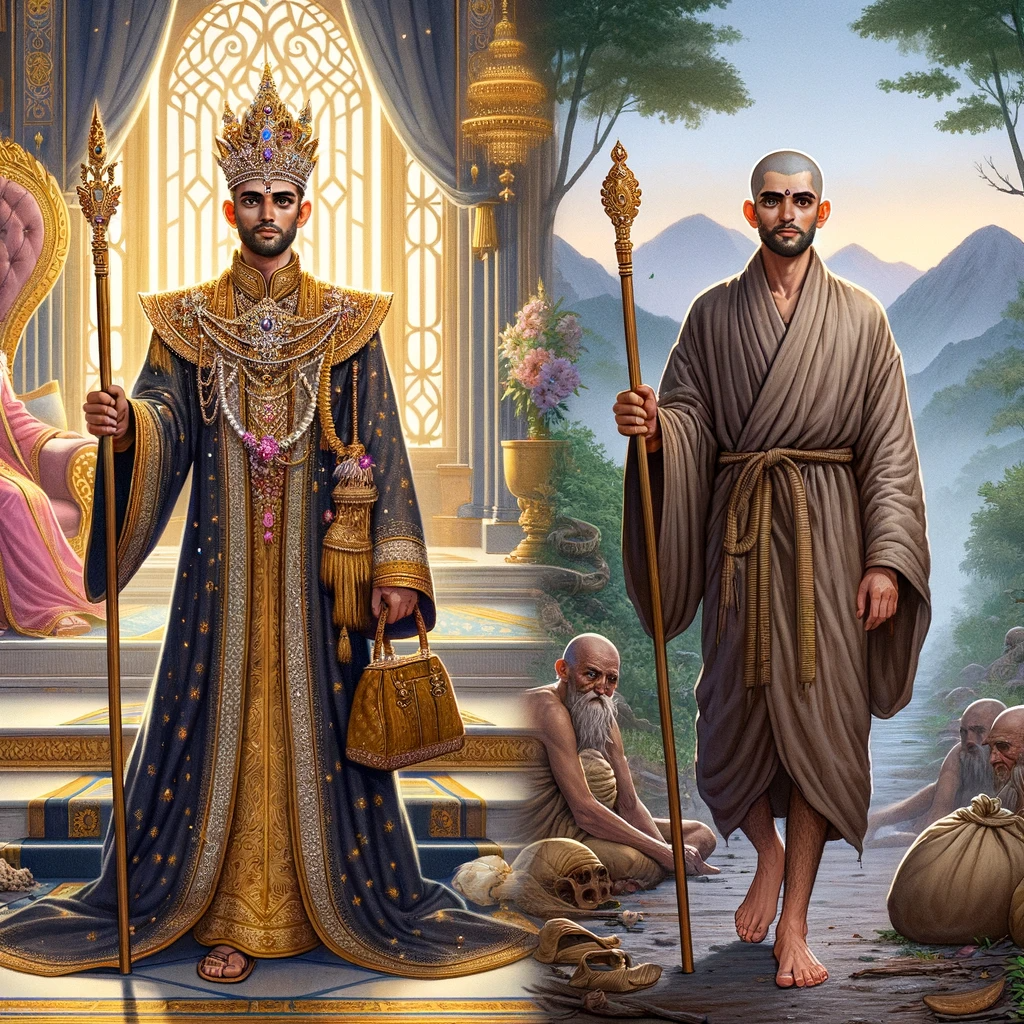Most people engage in worldly pursuits, laboring under the false impression that they will find personal wholeness or satisfaction there.
No satisfaction
Dissatisfaction with life is a problem as old as antiquity.
For savages of pre-history, life was a constant struggle to procure enough food to survive and obtain shelter from predators and other humans who wanted to take what little they had. The noble savage is a silly myth.
When humans banded together and became more civilized, small numbers of people began to live privileged lives, unfettered by the need to scavenge for food or worry about shelter. These few had a precious opportunity to live by their choices rather than the demands of the environment.
See: Tibetan Buddhist Lamrim: Your Precious Human Life
On the Indian sub-continent, mystic traditions began as a few people chose to examine their own experiences and look into the workings of their minds.
The practice of meditation developed as the primary method of introspection. Masters of this practice taught others, and the methods and realizations were passed on from generation to generation.
The problem with princes
Most of the rulers in ancient times were bloodthirsty warlords, completely self-centered and ruthless in their pursuit of power and wealth. However, their children who were raised in the safety and comfort of the palace often turned out differently.
Many royal princes were well-educated, and being wealthy and powerful, they often lived lives of pampering and enjoying hedonistic pleasures. They lived the lives everyone today strives for.
One would assume these royals were extremely happy and completely fulfilled, given that their every whim was indulged and their every wish granted. However, this turned out not to be the case.
Like teenagers today, these young princes sometimes rejected everything their fathers stood for. They didn’t want to be domineering warlords who took what they wanted by force to conspicuously consume for their own pleasure.
In Northern India, the problem of unhappy princes became so acute that many princes embraced a religious tradition called Jainism. Janists were committed to non-violence and asceticism, the rejection of all worldly pleasures and possessions.

At about this time, a prince named Siddhārtha Gautama also noticed that despite being attractive, famous, and wealthy, he wasn’t happy or satisfied. Like the Janist princes before him, he decided to leave the palace and live the life of an ascetic until he solved the problem of inherent unhappiness.
While it may seem like an incomprehensible and foolish decision, he and the Janist princes before him didn’t feel like they had anything to lose. They weren’t happy with their pampered lives in their palaces, so if they gave up everything but found happiness, it would be a price they were willing to pay.
Unlike most people, then or now, Siddhārtha Gautama realized that beauty, fame, and wealth did not provide the happiness and fulfillment that everyone imagines. He knew it from his personal experience. He had everything, yet, he did not have what everyone supposed him to have, fulfillment or peace of mind.
He was well-educated and extremely intelligent. He used his training in meditation to explore his mind and heart to determine why his life of beauty, fame, and wealth didn’t make him happy.
To his chagrin, he discovered that asceticism didn’t make him happy either. He had gone from one extreme to the other, and neither extreme worked. He discovered there was a middle way.
He became the Buddha, the awakened one.

Siddhārtha Gautama came to realize that a subtle form of suffering was present in every experience. This was his first Noble Truth. He had experienced the extremes of luxury and indulgence and the extremes of poverty and asceticism and found no escape.
He also taught that this seemingly inescapable suffering originated in the mind. It was not part of the environment. This was his second Noble Truth.
His breakthrough insight was that this seemingly inescapable suffering could be overcome. The possibility of ceasing the suffering was real. This was his third Noble Truth.
He explained that meditation was the actual path to the cessation of suffering. In particular, he taught that all phenomena are empty of inherent existence, meaning every characteristic of a person or object is entirely created by the mind itself.
When through meditation, a person comes to realize this deepest truth of the mind, they stop reacting to illusions of the mind as if they are real, and the suffering stops. This was his fourth Noble Truth.
See: Emptiness of Self: The Key to Buddhist Enlightenment
Beauty, Fame, and Wealth are sources of suffering, not satisfaction
Do you wish you were a ten? Do you believe that if only you attained the pinnacle of beauty, everyone would want you, and you would be totally happy?
When you were in high school, did you believe the popular people were much happier than you were? Even now, do you wish you were famous because the adulation of the masses would make you happy?
Do you look at the possessions of wealthy people, fancy cars, big houses, and expensive vacations and assume they are happy? Do you imagine that if you had unlimited spending money, you would be happy too?
Money can’t buy happiness, but it buys the best form of misery, right? Most people will take what they can get.
If you carry any of those beliefs, and nearly everyone does, you are deluding yourself. While everyone is subject to the ups and downs of life, the more someone has, the harder the worldly winds blow.
- Gain and Loss: This refers to material, social, or any other kind of gain and the inevitable counterpart of losing what one has gained.
- Fame and Disrepute: The pursuit of recognition, status, and fame, and the opposite experience of disrepute, disgrace, or being unnoticed.
- Praise and Blame: The experience of being praised and approved by others, as well as being blamed, criticized, or disapproved.
- Pleasure and Pain: Sensory experiences ranging from pleasure to pain, including both physical and emotional sensations.
Just another day in Samsara.
See: What is Buddhist Samsara?

A look through history or even today’s tabloid headlines demonstrates the fragility of the real lives of those we try to emulate.
Beauty fades
Attractive people appear to get more of what they want out of life, including fame and wealth. However, it doesn’t bring happiness, and when it fades, it can be very distressing.
- Marilyn Monroe: An iconic figure of beauty and glamour in the 20th century, Monroe struggled with personal issues, including depression, anxiety, and substance abuse. Despite her fame and attractiveness, she faced numerous challenges in her personal life and career. Her untimely death, under circumstances that remain a subject of speculation, suggests a profound unhappiness.
- Elizabeth Taylor: A stunning beauty and a celebrated actress, Taylor experienced a turbulent personal life, including multiple marriages and divorces, health problems, and battles with addiction. Her later years were marked by declining health, which strongly suggests a period of reduced happiness.
- Lord Byron: The famous poet was known for his good looks and charismatic personality. Despite his fame and attractiveness, he led a troubled life filled with romantic scandals, financial problems, and a self-imposed exile from Britain. His later years were marred by weight gain and chronic health issues, which affected his public image and personal satisfaction.

Fame turns to disrepute
People desire fame because they want adulation. Few set out to become famous for their misdeeds; however, many famous people become known more for their misdeeds than their accomplishments.
- Richard Nixon: The 37th President of the United States, Nixon resigned from office in 1974 in the wake of the Watergate scandal, which severely damaged his reputation.
- Oscar Wilde: Once a celebrated author and playwright, Wilde faced public disgrace and imprisonment in the late 19th century due to his homosexual relationships, which were considered illegal at the time.
- Marie Antoinette: The last Queen of France before the French Revolution, she became a symbol of the excesses of the monarchy and was executed in 1793. Accusations of frivolity and extravagance marred her reputation.
- Lance Armstrong: A celebrated cyclist and seven-time Tour de France winner, Armstrong was later stripped of his titles and banned from professional cycling for life due to doping charges.
- Bernard Madoff: Once a respected financier, Madoff was arrested in 2008 for running the largest Ponzi scheme in history, leading to a massive loss of wealth for his clients and a severe tarnishing of his reputation.
- Harvey Weinstein: A former film producer and co-founder of Miramax, Weinstein faced numerous allegations of sexual assault and harassment, leading to a significant fall from grace and criminal convictions.
Wealth and power turn to poverty and helplessness
Wealth and power nearly always lead to attachment. As Eddie Murphy noted in Trading Places, “The best way you hurt rich people is to turn them into poor people.”
- MC Hammer: Known for his hit song “U Can’t Touch This,” the rapper and dancer earned tens of millions in the early 1990s. However, due to lavish spending and poor financial management, he filed for bankruptcy in 1996.
- Nicolae Ceaușescu: The former Romanian dictator amassed considerable wealth during his rule. However, following the Romanian Revolution, he was captured, tried, and executed, and his assets were seized.
- Allen Stanford: Once considered a billionaire financier and sponsor of professional sports, Stanford was convicted of orchestrating a massive Ponzi scheme. He was sentenced to 110 years in prison in 2012, and his assets were seized or lost.
- Sean Quinn: Once Ireland’s richest man, Quinn declared bankruptcy in 2012. His downfall was largely due to massive losses in stock investments, particularly in the Anglo-Irish Bank during the 2008 financial crisis.
- Jordan Belfort: Known as “The Wolf of Wall Street,” Belfort made a fortune as a stockbroker through fraudulent schemes. He was later convicted of securities fraud and money laundering, leading to financial ruin.
Problems resulting from beauty, fame, and wealth
- Developing attachment and fearing loss
- Arising anger and disappointment from an actual loss
- Attracting false friends and sycophants
- Losing real friends and family
- Becoming demanding, impatient, and inconsiderate of others
Beauty, Fame, and Wealth are not inherently bad
The purpose of this post is to convince you that beauty, fame, and wealth are not inherently good. These things aren’t inherently bad, either. These characteristics become what the mind makes of them.
There are many examples of beautiful, famous, and wealthy people who live happy and fulfilled lives. However, those attainments are not the source of their happiness.
True happiness comes from within.
Those people with worldly attainments who are happy engage in spiritual practices to foster happiness whether they recognize it or not.

Generosity
Happy people give to others selflessly, without expecting anything in return. It includes the giving of material resources, providing inspiration to others, and volunteering.
Morality
Happy people are considerate of others, which is demonstrated in their words and conduct. They live virtuously, abstain from actions that harm others, and promote the welfare of all beings.
Patience
Happy people cultivate the ability to endure hardship, tolerate difficulties, and be patient with the imperfections of others. They are not perturbed by personal criticism and accept suffering without anger or resentment.
Effort
Happy people apply energy and diligence in pursuing the good and the wholesome, avoid harming others, and work for the benefit of others.
Wisdom
Happy people learn from their successes and their mistakes. They cultivate wisdom, feel regret for their misdeeds, and vow not to repeat them.
Happiness doesn’t come easy, and it’s always a work in progress. Genuinely happy people lead fulfilled lives, enjoy peace of mind, and make the most of whatever beauty, fame, and wealth they have.
